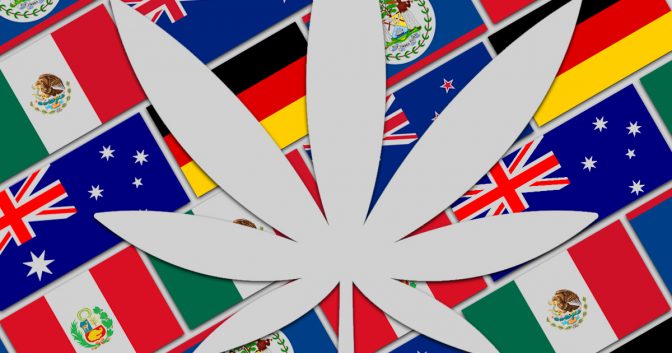Cannabis Law Reform Developments Around the World

According to the Brightfield Group cannabis market-research firm, the U.S. accounts for about 90% of the world’s legal marijuana sales. By 2021, it projects, that figure will drop to 57% due to international legalization developments. Most of that drop will be thanks to Canada, where the federal government plans to implement adult-use marijuana laws this summer. But other countries have also been making progress on marijuana-law reform. Here’s a look at some of the latest global policy developments.
EUROPE
Germany
Adult-use legalization is on the table legalization is on the table during negotiations to form a coalition government in the country. The Christian Democrats, the Free Democrats and the Green Party have become known as the “Jamaica Coalition” since their black, yellow and green colors add up to the ones on a Jamaican flag. The latter two parties have historically supported marijuana legalization, but have been focusing on other «more important» issues during the negotiations. Meanwhile, patients are still struggling to access medical cannabis after the drug was legalized one year ago.
THE AMERICAS
Belize
On Nov. 2, Governor General Sir Colville Young signed a bill into law that decriminalizes possession of up to 10 grams of marijuana. The legislation was approved by Parliament in October. Consuming cannabis on private property is no longer a criminal offense, but possession still may be subject to civil penalties under certain circumstances, such as having it on school premises.
Mexico
Last June, President Enrique Peña Nieto signed a decree to legalize low-THC marijuana. The move comes two years after the country’s Supreme Court declared that individuals have a constitutional right to grow and use cannabis. Meanwhile, Mexico’s tourism secretary made waves after suggesting that tourist-heavy areas should legalize recreational weed to help combat drug-related violence. He’s not alone: As U.S. states continue to reform their cannabis laws, a growing number of Mexican officials are calling for legalization.
Peru
In October, Congress voted 68-5 to approve legislation that would allow medical cannabis oil to be produced, sold and used. The bill was introduced after public outcry over a police raid on a medical-marijuana advocate’s home, which was being used as a makeshift lab to produce oil for sick children.
OCEANIA
Australia
Australia’s medical-cannabis program has come under fire for being overly restrictive. Only a few hundred patients have been approved for it since it began in late 2016, and legal medical cannabis can cost as much as A$120 (about US$95) per day. Those factors are pushing a majority of Australian patients to the black market. The center-right governing coalition of the Liberal and National parties has blocked a bill that would allow quicker access for terminally ill patients, despite overwhelming support from the opposition Labor and Green parties that got it passed in the Senate last October.
New Zealand
While conservatives have held power for nearly a decade, last October’s election installed Labour Party leader Jacinda Ardern as prime minister. The party formed a coalition government with the nationalist First Party and the liberal Green Party, which has advocated for marijuana legalization in the past. Ardern said the issue of recreational-marijuana legalization would be put before voters in a referendum in the next few years. Her administration proposed a medical-cannabis bill in January that passed Parliament unanimously. But a more liberal medical-marijuana bill was defeated just one day later.
RELATED ARTICLES
Inside Germany’s New Medical Marijuana Law
Freedom Leaf Goes to ICBC in Germany
Netanyahu Shuts Down Israel’s Cannabis Export Plan
The Highs and Lows of the Dutch Cannabis Experiment
Where Not to Go in Mexico: The 16 Most Dangerous States
If you enjoyed this Freedom Leaf article, subscribe to the magazine today!

